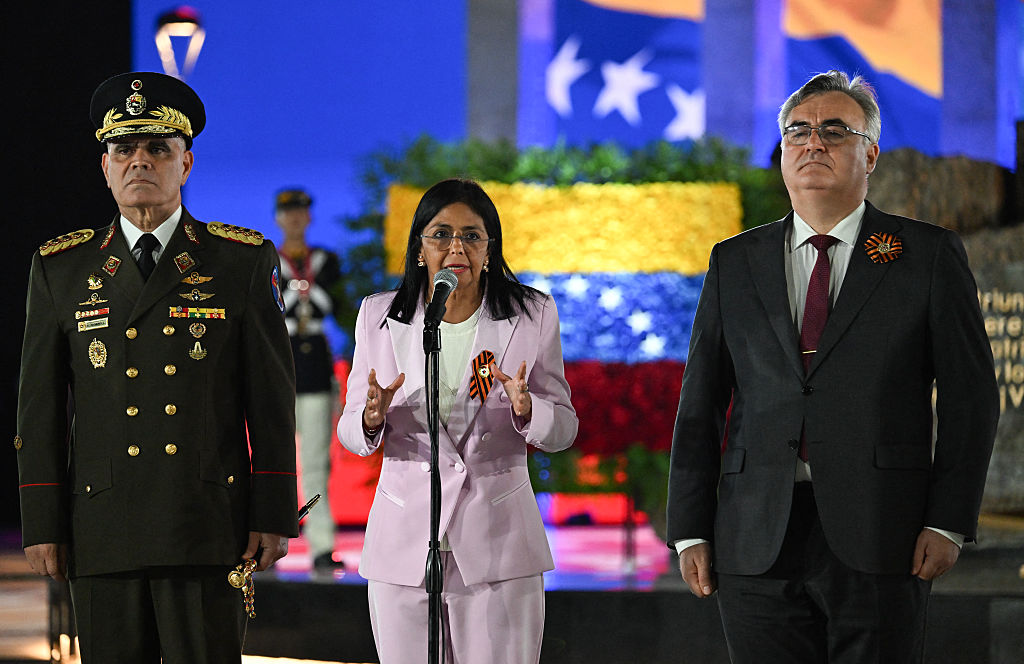Caracas Deepens Control of Oil Industry
Caracas Deepens Control of Oil Industry
Venezuela took steps to nationalize assets of dozens of oil-service companies, expanding the state firm's control of the oil industry. Caracas faces declining revenues resulting from a global oil price slump.
Venezuela took another step to widen nationalization of its oil industry this week. On May 7, the country’s National Assembly approved a law allowing the government to expropriate assets from contractors providing oil-field services. Venezuelan President Hugo Chávez heralded the move and indicated that all outsourced oil-related activities would eventually come under state control. “Mr. Man on the Moon, cover your ears because the cries of anguish from the bourgeoisie will reach the moon,” said the Chávez in a televised speech.
The expropriations, which begin May 8, affect private firms that manage water, steam, and gas injection used to boost oil well extraction rates. State-owned Petróleos de Venezuela (PDVSA) plans to take over 13 drilling rigs, 39 terminals, 300 boats, and 330 tugboats in the Lake Maracaibo area of the state of Zulia. More than 8,000 workers employed by private companies will be absorbed by PDVSA.
The Wall Street Journal reports Chávez’s government took the steps after a number of firms threatening to halt activities in Venezuela because PDVSA had failed to pay for services rendered. By the end of 2008, the total on that pile of unpaid bills amounted to roughly $14 billion, according to the article. On Thursday, Houston-based Boots & Coots International Well Control, announced intentions to suspend operations in Venezuela after two decades of work there to “limit financial exposure.” Other firms expect to lose tens of millions of dollars worth of uncollected payments. A Friday update by Reuters announced that PDVSA seized a major project by one of those firms—U.S.-based Williams Companies.
Two years ago, the Chávez government passed majority control of the energy-rich Orinoco belt from foreign private firms to PDVSA. The state oil company accounts for a third of the country’s GDP, half of the government’s revenue, and 80 percent of Venezuela’s export earnings. In the first three quarters of 2008, the state firm reported a 225 percent increase in profits.
But analysts believe Caracas is feeling the pinch of declining oil prices. A March article by Houston-based Rigzone reported about Chávez’s announcement that Venezuela’s debt will triple this year. While PDVSA revenues hit $120 billion last year, they could be as little as $50 billion this year, reports BusinessWeek. Moreover, in late April, Venezuelan Oil Minister Rafael Ramirez announced that PDVSA would cut costs by more than $10 billion, drawing investments down in maintenance and upgrades down to $14 billion.
In spite of rising revenues and oil prives, PDVSA’s debt increased by 146 percent last year, as Venezuela’s El Universal pointed out in a May 8 article. Moreover, the firm’s funding for social programs—a key to Chávez’s high approval ratings—declined by 58 percent over the previous year.
The move to nationalize assets held by oil-service firms comes at a time when critics of Chávez say the leader seeks to tighten his grip. Tyler Bridges writes in The Miami Herald that, “Chávez is sidelining enemies, stifling criticism and concentrating power in ways that critics and independent analysts say is creating an autocratic state with democratic trappings.” The Economist takes a look at Chávez’s battle with trade unions and his attempts to bypass them by creating “workers’ councils.” A profile of the Venezuelan president by Letras Libres Editor Enrique Krauze seeks to answer the question: “To what political tradition does Hugo Chávez's Bolivarian delirium belong?”








